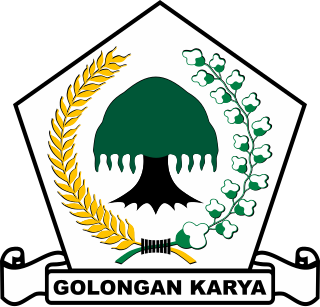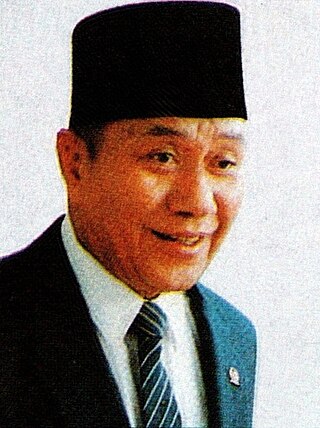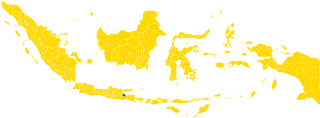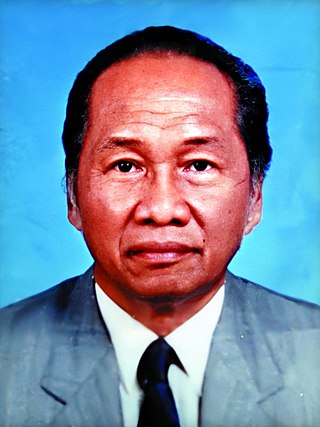
The Party of Functional Groups, often known by its abbreviation Golkar, is a political party in Indonesia. It was founded as the Joint Secretariat of Functional Groups in 1964, and participated for the first time in national elections in 1971 as Functional Groups. Golkar was not officially a political party until 1999, when it was required to become a party in order to contest elections.

Sudharmono, also known by his nickname, Pak Dar, was an Indonesian politician and army officer, who served as the 5th Vice President of Indonesia, under the New Order regime of president Suharto, serving from 1988 until 1993. Previously, he served in a number of positions in the government and military, including as the Chairman of Golkar, State Secretary of Indonesia, and a Lieutenant General in the army.
The Concern for the Nation Functional Party is a political party in Indonesia. The party was established by former members of the Golkar Party who were dissatisfied with Golkar's abandonment of former president Suharto including former minister Hartono and Suharto's daughter Siti Hardiyanti Rukmana. Suharto himself approved the party name.

The Jakarta Post is a daily English-language newspaper in Indonesia. The paper is owned by PT Bina Media Tenggara and based in the nation's capital, Jakarta.

The Order of Eleventh March, commonly referred to by its syllabic abbreviation Supersemar, was a document signed by the Indonesian President Sukarno on 11 March 1966, giving army commander Lt. Gen. Suharto authority to take whatever measures he "deemed necessary" to restore order to the chaotic situation during the Indonesian mass killings of 1965–66. The abbreviation "Supersemar" is also a play on the name of Semar, the mystic and powerful figure who commonly appears in Javanese mythology including wayang puppet shows. The invocation of Semar was presumably intended to help draw on Javanese mythology to lend support to Suharto's legitimacy during the period of the transition of authority from Sukarno to Suharto.

General (Ret) Amir Machmud was an Indonesian military general who was an eyewitness to the signing of the Supersemar document transferring power from President Sukarno to General Suharto.
Legislative elections were held in Indonesia on 29 May 1997. There were three simultaneous elections in one because voters were electing members of two levels of regional government as well as the national-level People's Representative Council. This was to be the last election of President Suharto's New Order regime, which collapsed a year later. Like the preceding New Order elections, it was won outright by the Golkar organization.

Legislative elections were held in Indonesia on 3 July 1971, the first under the New Order regime. There were ten participants; nine political parties and the "functional group" Golkar, which came first with more than 60 percent of the vote, resulting in an absolute majority in the People's Representative Council.

Legislative elections were held in Indonesia on 23 April 1987, to elect 400 of the 500 members of the People's Representative Council (DPR), the national legislature. The election was the fifth legislative election in the country since independence and the fourth legislative election under President Suharto's New Order. The election resulted in an outright majority for Golkar, which retained its status as the ruling party of the country.

Legislative elections were held in Indonesia on 9 June 1992, to select 400 of the 500 members of the People's Representative Council (DPR). The election was the sixth legislative elections since Indonesian independence and the fifth legislative elections under the New Order regime of president Suharto. The election resulted in a clear victory for Golkar, which retained its status as the ruling party, although the opposition, under the United Development Party (PPP) and the Indonesian Democratic Party (PDI), saw their vote shares rise.

Early legislative elections were held in Indonesia on 7 June 1999. They were the first elections since the fall of Suharto and end of the New Order, and the first free elections in Indonesia since 1955. With the ending of restrictions on political activity following the fall of Suharto, a total of 48 parties contested the 462 seats up for election in the People's Representative Council. A further 38 seats were reserved for members of the armed forces.
The Petition of Fifty was a document protesting then President Suharto's use of state philosophy Pancasila against political opponents. Issued on 5 May 1980 as an "Expression of Concern", it was signed by fifty prominent Indonesians including former Army Chief of Staff Nasution, former Jakarta governor Ali Sadikin and former prime ministers Burhanuddin Harahap and Mohammad Natsir.
The Patriot Party was a political party in Indonesia. It was established as the Pancasila Patriot's Party as a result of a deliberations at the sixth national conference of the Pancasila Youth organization in 1996. At the time, the organization's political goals were channeled by Golkar, but in its conference the year after the 1998 Fall of Suharto, Pancasila Youth withdrew from Golkar. The conference also decided the time was right to establish a political party, and it was declared on 1 June 2001, the anniversary of Sukarno's Pancasila speech. The party was officially and legally established two years later. Thus the Patriot Party was described as the political wing of the Pancasila Youth.

Rizal Mallarangeng is an Indonesian politician. He served as a senior advisor to Indonesia's Coordinating Economic Minister (2004-2005) and Coordinating Welfare Minister (2005-2008) Aburizal Bakrie. He also served as a member of Golkar Party's Leadership Committee under Aburizal Bakrie and Airlangga Hartarto.
Indonesia Raya was an Indonesian newspaper co-founded in 1949 by Mochtar Lubis. Before its permanent closure in 1974, it was banned numerous times during the Sukarno and Suharto governmental period.
Suara Pembaruan was an Indonesian daily newspaper. Founded in 1987, it was one of the largest newspapers in Indonesia. Suara Pembaruan brand is owned by BeritaSatu Media Holdings, a subsidiary of Lippo Group who also owned business daily Investor Daily and television channel BeritaSatu.

Achmad Arnold Baramuli was an Indonesian prosecutor, politician and businessman. His highest position was chairman of the Supreme Advisory Council over 1998 to 1999 under President B.J. Habibie. A key vote-winner for Golkar Party, Baramuli was involved in the 1999 Bank Bali scandal that contributed to Habibie's failure to win re-election.

Sayidiman Suryohadiprojo was an Indonesian military officer and diplomat who served as Deputy Chief of Staff of the Indonesian Army from 1973 until 1974, Ambassador of Indonesia to Japan from 1979 until 1983, and Ambassador-at-large of Indonesia to Africa from 1992 until 1995.














